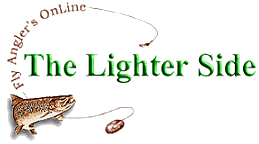Twilight Symphony
by
Bob Krumm, Guide and Fly Tier
Early spring fishing is perhaps the most enjoyable time of
the year for me. The fishing success can be rated from good to off the
scale. To make things even better, the earth is coming to life again.
Wild flowers start to make their appearance with the
hardiest and earliest flowers growing a scant inch from the ground and
are not very conspicuous to a casual observer.
On the rivers the first fly hatches are occurring. Most of
the emerging insects are midges, but some might be small
stoneflies or blue-winged olive mayflies.
The midge hatches are what interest me; though they hatch
during the morning hours, it is not until late afternoon that they
cluster on the water. These clusters are twice to four times larger
than a solitary midge. Some midge clusters are as large in diameter as
a nickel.
With clusters approaching small change size, you can bet
the trout are going to take notice. Trout will often ignore single
midges but clusters of midges will get a trout's attention quickly.
It behooves an angler to stay out on the water until late
afternoon so he or she can partake of some of the best dry fly
fishing of the year.
I can picture it all now, a small pool on the edge of the
river. The current flows over a shallow gravel bar and drops into a
four to five foot deep hole. A few old logs and other detritus jut out
from the bank. A number of trout have lined up along the feed line and
are gulping the midge clusters as they float by on the dying current.
The trout take the insects with a barely audible "puck."
The sound is the beginning for my dusk symphony. You see, though I am
out on the river to fish, I am also on the river to hear one of the
greatest collections of sounds going.
The light dims as the sun starts to dip below the
horizon, a rooster pheasant gives a loud crow and follows up by beating
his wings. Another rooster answers the call, then another answers the
second bird. Soon there are a half dozen or so rooster pheasants
calling back and forth. Each is trying to convince some unseen hens
he is the studliest cock bird that walks the face of the earth and
he would be the best father possible for her chicks.
A flicker hammers away at a dead branch. His work song
echoes across the land and provides the percussion for the up coming
symphony.
Pretty soon the Canada geese contribute their voices to the
evening sounds. "Hoowoonk, hoowoonk" emanates from a nearby island.
Another goose answers the first call. The calls become
quicker, more rapid fire and excited. Soon the whoosh of wings is added
to the evening's noises. The geese fly off to a nearby strip of green
grass where they loudly proclaim it the most luscious green
grass they have ever seen.
Robins start their chorus. Each male claims a particular area his
and is willing to allow a female to set up housekeeping.
High in the sky a ghost-like "woooowooowooo" drifts to
the earth. A common snipe is diving and when he pulls out of his dive
the ghost-like call comes from the wind rushing through his primaries.
Red-winged blackbirds join in with a cacophony of sounds as
each male tries to get in one last song before nightfall.
From a nearby marsh chorus frogs start up. "Kerricck,
kerricck" fills the noisy air.
Sandhill cranes add their trumpet-like call to the night
air.
For a few moments, the sounds of the evening are awesome.
The trout slurping provide a rhythmic note to the other sounds
filling the air. Pheasants, geese, cranes, flickers, frogs, snipe,
blackbirds, and trout combine to make one of the most soul-filling
symphonies a person can partake of.
Slowly the sounds subside. After a few minutes only a
few chorus frogs can be heard. The final sound of the evening is the
hoot of a great horned owl proclaiming that night has arrived and he
will rule the darkness.
It is time to pack it in and call it a day. The symphony is
over; the trout have stopped rising. Oh well, tomorrow evening
another symphony will commence and it will be worth listening to
another version of nature's dusky symphony. ~ Bob Krumm, Guide and Fly Tier
Lighter Side Archive
|

